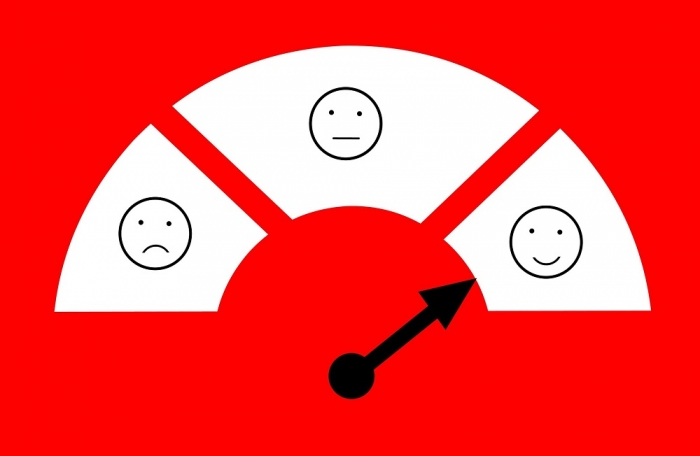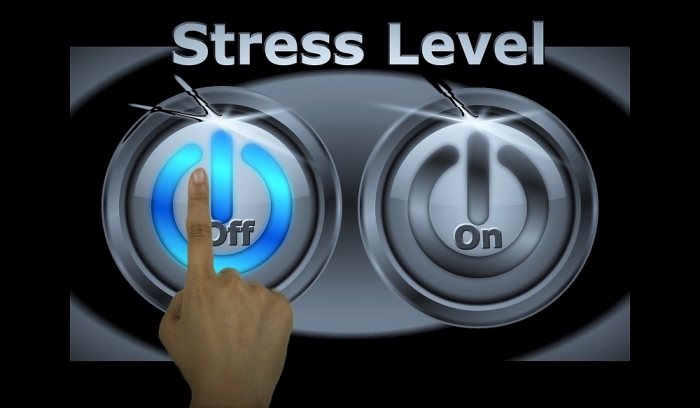
Negative Thinking Habits: Do You Have Them? Find Out Here!
Do you think there is more optimism in the world or more pessimism?
Do people tend to be more positive or more negative?
If you think pessimism and negativity reign, you are statistically correct.
Furthermore, pessimism and negativity cause stress.
In this post you will learn:
- Is it natural to be negative?
- How prevalent is negativity in today’s society?
- What causes the prevailing negativity?
- Is negativity contagious?
- How is negativity harmful to you?
- Health benefits of optimism
- Negative Thinking Habits you might not know you have
- 8 Common Sense Self-talks to change Negative Thinking Habits
- A magical trick to cultivating more optimism
The Evidence for Negative Thinking Habits
Research shows there is a general tendency for people to remember and gravitate to memories of negative occurrences. “Some people do have a more positive outlook, but almost everyone remembers negative things more strongly and in more detail,” said Prof. Clifford Nass of Stanford University.
We’re not alone! The animals do it, too.

Repeated research shows signs in animals that corroborate the evidence. The attraction to the negative is a wide-ranging psychological principle. (Roy F. Baumeister, Professor of Social Psychology, Florida State University: “Bad Is Stronger Than Good,” The Review of General Psychology).
“Put another way,” says Prof. Baumeister, “You are more upset about losing $50 than you are happy about gaining $50.”
Have you noticed?
Bad news dominates the news headlines.
 Sure, the nightly news might end on a positive note with an invitation to return tomorrow. But they greet and grab you with the shocking, breaking news.
Sure, the nightly news might end on a positive note with an invitation to return tomorrow. But they greet and grab you with the shocking, breaking news.
With every media mogul competing for our negative appetites, it’s no wonder we perpetuate negative attitudes in our environments.
Many people say they prefer good news but experiments monitoring behavior show evidence to the contrary.
Researchers at McGill University have studied the collective hunger of humans to hear and remember bad news. They present their findings as solid evidence of “negativity bias”.
When presented with things of equal intensity, participants showed these results:
Things of a more negative nature (such as unpleasant thoughts, emotions, or social interactions; harmful or traumatic events) had a greater effect on their psychological state and processes than neutral or positive things.
So, the media naturally responds to the demands of the prevailing masses.
Even in a relationship between two individuals, one depressed and the other optimistic, the tendency is for the depressed feeling to prevail. The optimistic person generally succumbs to a lower mood level, as if it’s contagious.
Some people have a chemical makeup of more endorphins that send a euphoric message to the brain. They rarely appear negative. However, most people are subject to the influence of mass media and mass consciousness.
With all these negative influences working around us, it takes intentional energy and effort to become and stay optimistic.
Evolutionary Patterns of Negative Thought?
Is negativity contagious? Are we helplessly smothered by negative stimulants that surround us? Why is there so much negativity in society?
Scientists – anthropologists and psychologists – have explored civilizations to discover some logical explanation.
There are physiological as well as psychological reasons for this.
Psychologists explain that people tend to ruminate more about unpleasant events because of our brains.
According to Prof. Nass, our brains handle positive and negative information in different hemispheres The negative emotions require more thinking and processing of information. Negative emotions also use stronger words to describe the un-pleasantries than the happy ones. [Prof. Nass co-authored “The Man Who Lied to His Laptop: What Machines Teach Us About Human Relationships” (Penguin 2010)]

From the evolutionary standpoint, negative thinking is a natural survival strategy.
Thousands of years ago, our hunter-gatherer ancestors were more likely to survive hostile and scarce environments when they were attuned to bad things.
“Survival requires urgent attention to possible bad outcomes but less urgent with regard to good ones,” says Prof. Nass.
→ So, negativity at its roots is fear-based. Chronic negativity becomes pessimism.
If the thoughts that run through your head are mostly negative, then your outlook on life is more likely to be pessimistic.
Thus the affinity for pessimism eventually became an evolutionary trait. So, we distant descendants of the hunter-gatherers inherited negative tendencies over the eras of civilization. Today, it is the residual remnant of earlier times. Despite moving beyond that distant world, modern society retains the tendency. Maybe it is a propensity built into our DNA.
Think about it:
What are we protecting ourselves from today? Do we live in a perpetual fear of something going wrong? Are we hypercritical of ourselves such that we doubt our ability to meet expectations? Do we tend to see the negative side in order to protect ourselves from disappointment? (“Oh, fat chance I’ll be chosen.”)

How about this?
Maybe subconsciously we prefer the greater intensity of emotion.
Hasn’t literature proven this true –
from the immortal Ancient Greek tragedies right up to Hollywood’s blockbusters?
How do people regard themselves?
So much for the objectivity of scientific observations. Now, how do people view themselves – subjectively?
In a survey of 800 respondents, only half considered themselves optimists. Most of the other half wavered between a self-regard of optimist and pessimist.

How Do Negative Thinking Habits Hurt You?
Negative thinking that repeats itself day after day, and builds on itself, becomes chronic. Chronic negative thinking can damage the body and mind and result in disease.

Negativity releases more cortisol, the main stress hormone, and thereby upsets the balance of the immune system, making one more vulnerable to illness and disease.
Furthermore, negativity and the accompanying stress affect stem cells that cause changes in the brain.
Now, this does not register in immediate symptoms. However, chronic stress — too much for too long, has consequences.
If the thoughts that run through your head are mostly negative, your outlook on life is more likely pessimistic.
Optimism Improves Your Health!
Studies have further linked people’s tendencies toward optimism and pessimism to their health outcomes.
Researchers Julia Boehm and Laura Kubzansky reviewed over 200 published studies and found that a positive psychological outlook – optimism, life satisfaction and happiness – was strongly associated with a reduced risk of cardiovascular disease.

Specifically, “the most optimistic individuals had an approximate 50% reduced risk of experiencing an initial cardiovascular event compared to their less optimistic peers.”
The researchers also traced a link between optimism and cholesterol levels in the blood.
Optimistic individuals had higher levels of good cholesterol and lower levels of triglycerides.
Researchers are discovering other health benefits of positive thinking:

• Increased life span
• Lower rates of depression
• Lower levels of distress
• Greater resistance to the common cold
• Better psychological and physical well-being
• Better coping skills during hardships and times of stress
In another post on our Stress Buffer blog, we discuss the effect of negativity on stress. You might like to check it out.
How Can You Stay Positive and Realistic At the Same Time?
Positive thinking doesn’t mean you keep your head in the sand and ignore life’s less pleasant situations. Positive thinking just means you face the real situation of unpleasantness in a more positive and productive way.
You think the best is going to happen, not the worst. Positive thinking does not preclude your awareness of all potentialities but it puts your focus on the favorable outcome.
Negative thoughts manifest in chemical reactions that can affect your body by bringing more stress into your system and decreasing your immunity.
In contrast, positive thoughts can actually release neuropeptides that help fight stress and potentially more-serious illnesses.
Therefore, pessimism causes stress. Optimism relieves stress.
Negativity is destructive. Positivity is constructive.
Makes sense, doesn’t it? So, it makes sense to see the positive side rather than allow yourself to gravitate to the negative view of everything and everyone, doesn’t it?
If we accept the evolutionary theory that there is a natural pull to negativity, then again we see that it requires energy and effort to reverse or hold back the force, or tendency. Right?
How Can You Become More Positive and Stress-Free
The good news that follows from this theory is that negativity is a tendency, not an absolute. This means that you, as a human with free will, possess the ability to override it.
Just because we, as humans, have a propensity toward negativity, does not mean we have to submit to it. The tendency toward negative thinking, like the stress it causes, is a habit.
A habit is a settled or regular tendency or practice, especially one that is hard to give up.
→ You can break a habit. The trick to breaking a habit is replacing the habit. Read on.
 To turn it around, first, you have to be aware of any negative thought pattern.
To turn it around, first, you have to be aware of any negative thought pattern.
In this blog, we personalize the techniques, tactics and tips to ensure your personal achievement.
So, you must start by taking inventory of the way you personally view yourself, things and events around you.
Your Reflective Checklist
The following shortlist will help you to assess yourself honestly and privately.
If negativity is endemic in our society, then it follows that we could all benefit from less negativity and thereby enjoy less stress and better health.
Negativity comes in many shapes and forms. Check these examples of common negative thought patterns to discover whether you relate to any of them.
1. This always happens when I’m running late.
2. Too bad it’s raining. I was going to get the car washed today.
3. Interviews don’t go well for me. That’s just the way it is.
4. I shouldn’t keep doing this. It’s a bad habit.
5. I made a mistake. Now I feel so inadequate.
These little self-deprecating expressions may seem harmless. However, these are modes of thinking that go viral in your mind and create stress! They arise from stress and create more stress!
To really understand how this may be happening to you, access my digital handbook, FREE for you, right here –>
You’re sure to find it both revealing and entertaining.
Psychologists refer to all these negative thinking habits as cognitive distortions – ways we convince ourselves that unfounded beliefs are true. These distortions are inaccurate thoughts that usually just reinforce negative thinking or emotions. They may sound rational and accurate to us and even to the sympathetic ear of a friend, but they are not factual and really serve only to keep us feeling bad about ourselves.
Listen: Negative thinking habits can easily sap anyone’s energy with worry and stress. Obsession with this irrational thinking becomes part of the plan going forward. This is why negative thinking habits usually generate “worst case scenarios”.
Antidotes to Negativity
If you felt some affinity with any of the negative thought patterns in the Self-Check, you are over-worrying and creating undue stress for yourself. You do not have to accept this.
Remember this: Thoughts are the malleable instruments of our minds. We can deconstruct bad thoughts and replace them with constructive thoughts. The key to removing a bad thought or bad habit is to replace it with a desirable one.
Keep watch of your reactions to situations, your general views, and your moods. Play like a third party mentor to yourself. Refer to the following Common Sense Self-Talk list. When you find your feeling or thinking is in a negative mode, tell yourself any of the statements you see there. This is likely to dispel your imaginary thinking (yes, imaginary), awaken a more a rational reaction, and open the way to more productive behavior.
Change Negative Thinking Habits with Common Sense Self-Talk, like this:
1. “Am I simply reacting to this situation or am I preparing to respond to the problem?”
2. “Do I have any concrete proof that something horrible is going to happen or is it all just in my head?”
3. “In the past, have I always been correct about this type of situation, or am I now repeating wrong assumptions as I had before?”
4. “Just because I had a similar experience in the past, am I 100% certain a catastrophe will occur?”
5. “Just because one person didn’t like my work, is it reasonable for me to feel sorry for myself?
6. “Am I being realistic or am I just letting my rich imagination get the best of me?”
7. “Risk is natural – it doesn’t mean something bad will actually happen to me.”
8. “I am letting go of this thought about the worst thing happening! I’m replacing it with a desirable outcome.”
One last magical trick
 LAUGH
LAUGH 
Whenever You Can
Laughter is a medically proven antidote to stress. Laughter dispels your current bout of negativity for a time.
It’s no joke. When you laugh, your whole body relaxes and your brain sends out the pleasure and happiness signals.
Don’t believe me? Mayo Clinic says, “Laughter enhances your intake of oxygen-rich air, stimulates your heart, lungs, and muscles, and increases the endorphins that are released by your brain.”
Laughter Heals
The success story of Larry Cousins, long-time Editor of the historic literary journal, The Saturday Review, proved the healing power of laughter.
After being diagnosed with a terminal illness, Mr. Cousins extended his life for many years with his self-selected treatment of humor. He requested comedy TV reruns of the funniest skits and programs he could think of. Every day he surrounded himself with hilarious entertainment and freely laughed so that his whole body experienced positivity, joy, and optimism.
The shocking success of Mr. Cousins’ regained health added a new dimension to the medical field’s approach to healing. Laughter does indeed generate good body and brain chemistry.
The Humor File
When you see a cartoon or story that humors you, put it into a file. Call it your “Humor” file. Keep it on hand and look through it periodically.
Whenever I check my Humor file, I am unreservedly in l-o-l mode.
Share something from the Humor file with a colleague, friend or family member. It’s very uplifting and remarkably contagious.
So, to discourage negative thinking habits, be ready to laugh when it is appropriate and reasonable to do so.
Your Takeaway:
Negative thinking habits proliferate across the majority of world populations, according to scholarly research and personal admissions.
Negative news and the literary arts feed the apparent need for the negative and tragic. Together, they reinforce negative thought patterns and pessimism.
Theories trace negativity to evolutionary needs for survival. Researchers detect the tendency in animals.
Yet, negativity is tied to stress. Chronic negativity stresses the body and threatens normal health functions.
Positive thinking and optimism lowers stress levels and improves a person’s health.
The Self-Check and Self-Talk lists in this post will set you on the right path to improve your mental and physical health.
What do you think?
Is it natural to be negative?
Do you think people inherit the tendency? Or do they acquire it?
We love to read your thoughts in the Comment box below.
10 Stress Habits and Alternatives!





Right here is the perfect website for anybody who hopes to understand this topic. You understand so much its almost hard to argue with you (not that I personally would want to…HaHa). You certainly put a new spin on a subject which has been discussed for many years. Excellent stuff, just wonderful.
Thanks for your comment. Try Your Free E-Guide. It is sure to be revealing.
Chris
It’s difficult to find educated people in this particular topic, however, you sound like you know what you’re talking about! Thanks